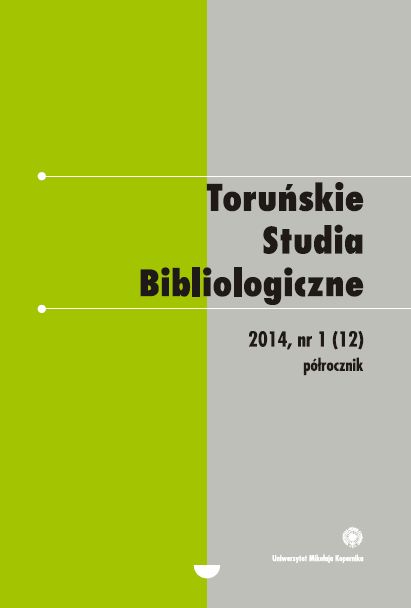Traditional vs. Digital Reading – Changes in Reading Culture
DOI:
https://doi.org/10.12775/TSB.2014.006Keywords
convergence, new media reading culture, reading – habitsAbstract
Changes in expectations and mentality of the modern reader make classic approach to the process of reading out of date. Nowadays the reader has a choice between two parallel media: traditional and digital. They both present the same information but in different ways. The user may choose to use the traditional form or turn to digital media. Users often end up switching between both forms of presentation. One of the problems related to this change in reading paradigm is identifying reading habits transferred by users from traditional to electronic media and vice versa. The article attempts to answer this question as well as discuss the future of traditional media in the context of the evolving digital forms.References
Burbules C. Nicholas, Retoryka sieci: hiperlektura oraz krytyczny poziom piśmienności, [w:] Ekrany piśmienności. O przyjemnościach tekstu w epoce nowych mediów, pod red. Andrzeja Gwoździa, Warszawa 2008.
Chymkowski Roman, Izabela Koryś, Olga Dawidowicz-Chymkowska, Stan czytelnictwa 2012 ostateczny [online]. Biblioteka Narodowa [dostęp 31 maja 2014]. Dostępny w World Wide Web: http://www.bn.org.pl/download/document/1362741578.pdf.
Cieśliński Piotr, Czy e-booki zmienią nam mózgi? „Gazeta Wyborcza” [online] z dn. 13 marca 2012 [dostęp 31 maja 2014]. Dostępny w World Wide Web: http://wyborcza.pl/1,75400,11333409,Czy_e_booki_ zmienia_nam_mozgi_.html.
Gorlick Adam, Media multitaskers pay mental price. Stanford study shows, „Stanford news” [online] 2009, August 24 [dostęp 31 maja 2014]. Dostępny w World Wide Web: http://news.stanford.edu/news/ 2009/august24/multitask-research-study-082409.html.
Jeong Hanho, A comparison of the influence of electronic books and paper books on reading comprehension, eye fatigue, and perception, „The Electronic Library” [online] 2012, Vol. 30, No. 3 [dostęp 31 maja 2014]. Dostępny w World Wide Web: http://www.emeraldinsight.com/journals.htm?issn=0264-0473&volume= 30&issue=3&articleid=17036371&show=pdf&PHPSESSID=4hm14s4d2btpnvfts2vo16aob7.
Konkel Mirosław, Refleks zamiast refleksji, „Tygodnik Powszechny” [online] 2013, nr 5 [dostęp 31 maja 2014]. Dostępny w World Wide Web: http://tygodnik.onet.pl/cywilizacja/refleks-zamiast-refleksji/5pesy.
Liu Ziming, Reading behavior in the digital environment. Changes in reading behavior over the past ten year. „Journal of Documentation” [online] 2005, Vol. 61, No. 6 [dostęp 31 maja 2014]. Dostępny w World Wide Web: http://www.emeraldinsight.com/journals.htm?issn=0022-0418&volume=61&issue=6& articleid=1529390&show=pdf&PHPSESSID=6c1pt4u79a378t834ct3iigi44.
Mózg pracuje tak samo przy czytaniu ebooków i zwykłych książek [online]. Nauka w Polsce – Serwis PAP poświęcony polskiej nauce [dostęp 31 maja 2014]. Dostępny w World Wide Web: http://www.naukawpolsce.pap.pl/aktualnosci/news,394682,ekspert-mozg-pracuje-tak-samo-przy-czytaniu -ebookow-i-zwyklych-ksiazek.html.
Stoop Judith, Paulien Kreutzer, Joost Kircz, Reading and learning from screens versus print: a study in changing habits, „New Library World” [online] 2013, vol. 114, no. 7/8 [dostęp 31 maja 2014]. Dostępny w World Wide Web: http://www.emeraldinsight.com/journals.htm?issn=0307-4803&volume=114&issue= 7&articleid=17092908&show=pdf.
Vandendorpe Christian, Od papirusu do hipertekstu. Esej o przemianach tekstu i lektury, Warszawa 2008.
Downloads
Published
How to Cite
Issue
Section
Stats
Number of views and downloads: 1010
Number of citations: 0



